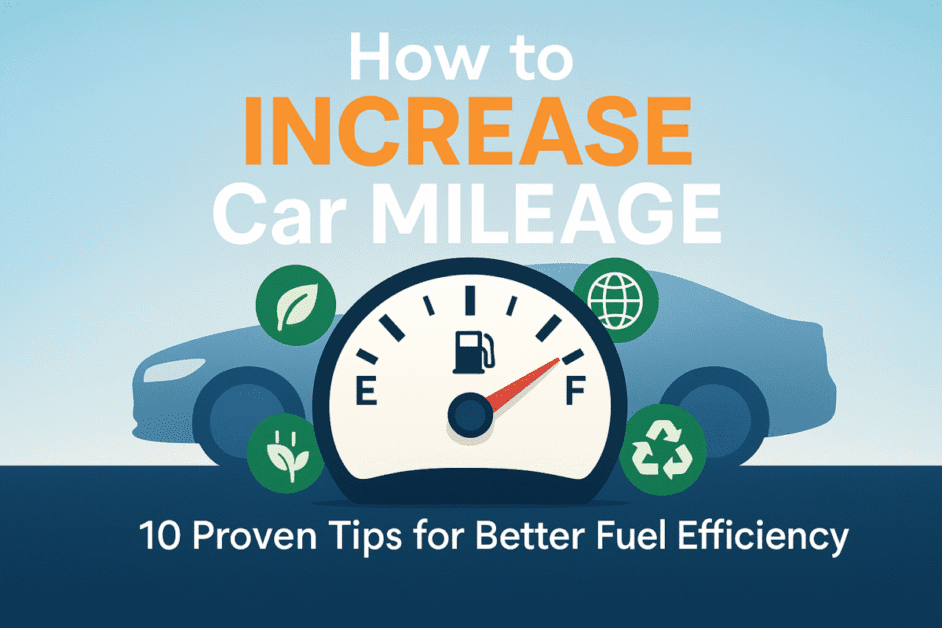Have you ever watched your fuel gauge drop faster than your bank balance after a shopping spree? 🚗💸 You’re not alone. With rising petrol prices and growing environmental concerns, learning how to increase car mileage has become more crucial than ever. The good news? You don’t need to buy a new hybrid or electric car to dramatically improve your car’s fuel efficiency.
I’ve spent years researching and testing various methods to optimize fuel consumption, and I’m excited to share these practical tips that can help you save hundreds of rupees every month while reducing your carbon footprint.
Key Takeaways
- Proper driving techniques can improve fuel efficiency by 15-40% without any modifications
- Regular maintenance including timely oil changes and air filter replacements significantly boost car mileage
- Tire pressure optimization alone can increase fuel economy by 3-5%
- Reducing vehicle weight and removing unnecessary items improves petrol consumption
- Smart route planning and avoiding peak traffic hours maximize fuel efficiency
Understanding Car Mileage and Fuel Efficiency
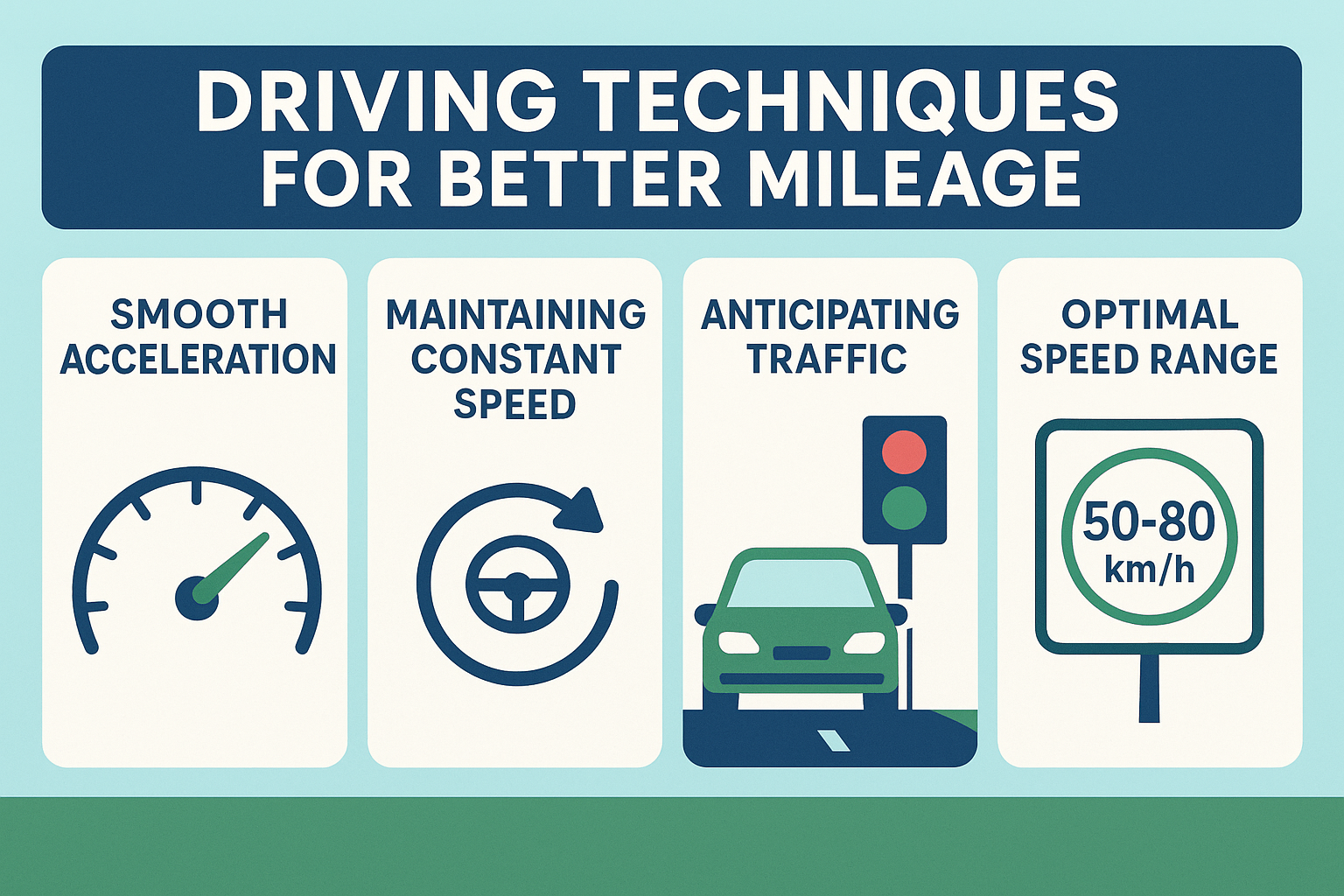
Before diving into the practical tips to increase car mileage, it’s essential to understand what affects your vehicle’s fuel consumption. Car mileage refers to the distance your vehicle can travel per unit of fuel, typically measured in kilometres per litre in India.
Several factors impact your car’s fuel efficiency:
- Engine condition and maintenance
- Driving habits and techniques
- Vehicle weight and aerodynamics
- Road conditions and traffic patterns
- Fuel quality and type
Modern petrol cars like the Toyota Corolla and Honda ZR-V Hybrid are designed with optimal fuel efficiency in mind, but even older vehicles can achieve better mileage with the right approach.
🚗 Fuel Efficiency Calculator
10 Proven Tips to Increase Car Mileage
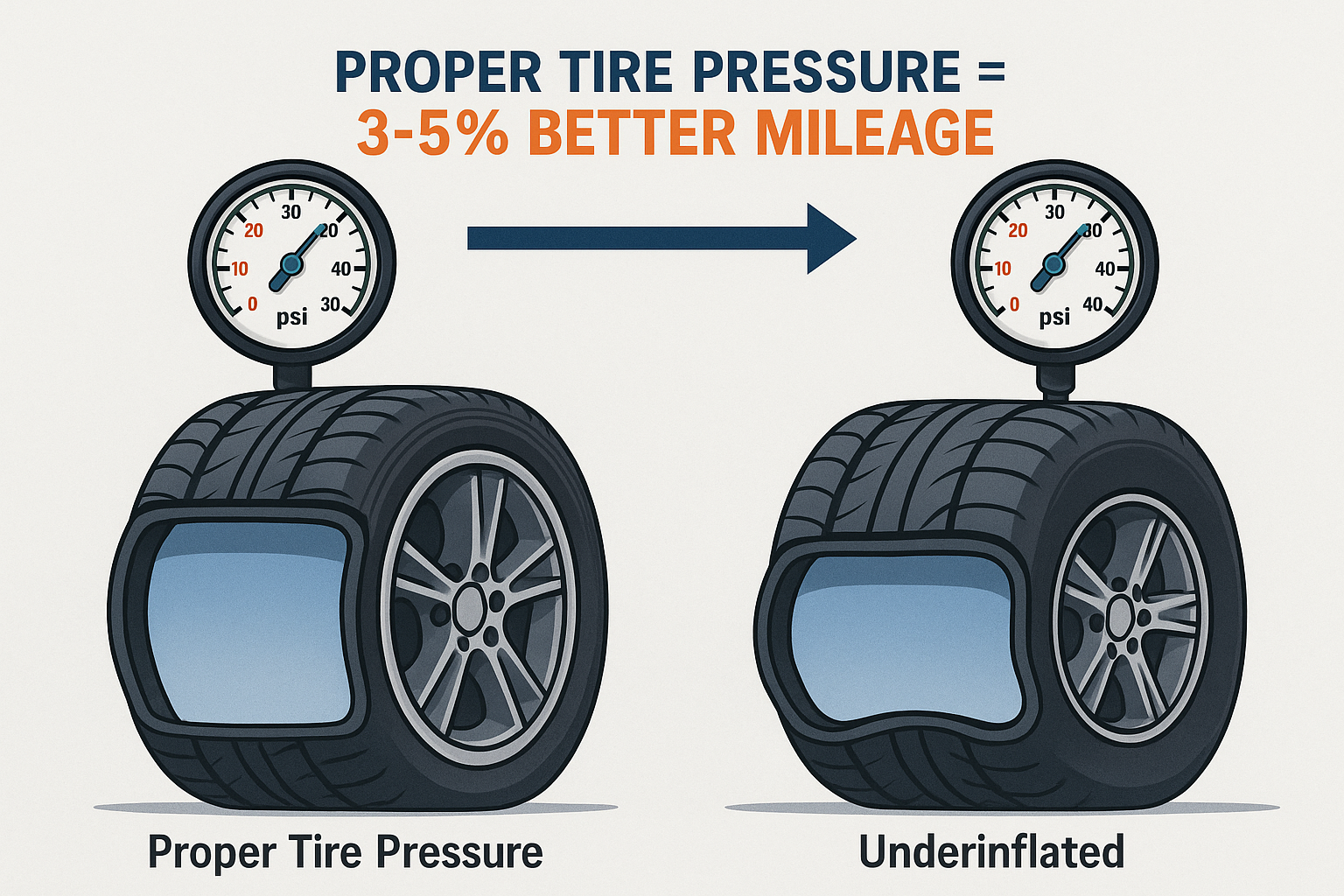
1. Master Your Driving Techniques for Better Fuel Efficiency
Smooth driving is the cornerstone of excellent fuel economy. Aggressive driving, including rapid acceleration and hard braking, can reduce fuel efficiency by up to 40% on highways and 30% in city traffic.
Key driving techniques to improve car mileage:
- Gradual acceleration: Accelerate slowly and steadily instead of flooring the pedal
- Maintain constant speed: Use cruise control on highways when possible
- Anticipate traffic: Look ahead and coast to red lights rather than braking hard
- Optimal speed range: Drive between 50-80 km/h for maximum fuel efficiency
“The way you drive your car has the single biggest impact on fuel consumption. Small changes in driving habits can lead to significant improvements in mileage.” – Automotive Efficiency Expert
2. Maintain Proper Tire Pressure to Reduce Rolling Resistance
Underinflated tyres increase rolling resistance, forcing your engine to work harder and consume more fuel. Properly inflated tires can improve fuel economy by 3-5%.
Tire maintenance checklist:
- Check tire pressure monthly using a reliable gauge
- Inflate to manufacturer’s recommended PSI (found in owner’s manual)
- Inspect for uneven wear patterns
- Rotate tires every 10,000-12,000 km
- Replace worn tires promptly
Low tire pressure not only affects fuel consumption but also reduces tire life and compromises safety. Modern cars like the Hyundai Creta 2025 come with tire pressure monitoring systems to help maintain optimal pressure.
3. Regular Engine Maintenance for Optimal Performance
A well-maintained engine is crucial for better fuel efficiency. Regular servicing ensures all components work harmoniously to deliver optimal fuel economy.
Essential maintenance tasks:
| Maintenance Item | Frequency | Impact on Mileage |
|---|---|---|
| Engine oil change | Every 5,000-10,000 km | 5-10% improvement |
| Air filter replacement | Every 15,000-20,000 km | 10-15% improvement |
| Spark plug replacement | Every 30,000-40,000 km | 5-8% improvement |
| Fuel filter cleaning | Every 20,000-25,000 km | 3-5% improvement |
A clogged air filter restricts airflow to the engine, creating a rich fuel mixture that increases fuel consumption. Similarly, old engine oil increases friction and forces the engine to work harder.
4. Reduce Vehicle Weight for Better Mileage
Every 50 kg of weight in your car can reduce fuel efficiency by 1-2%. Remove unnecessary items from your car to improve mileage instantly.
Items to remove:
- Sports equipment you’re not using
- Heavy tools and spare parts
- Multiple water bottles and bags
- Roof racks and carriers when not needed
Consider the Tata Nano, which achieved excellent mileage partly due to its lightweight design. While you can’t change your car’s basic weight, removing excess cargo helps significantly.
5. Plan Your Routes and Avoid Peak Traffic
Smart route planning can dramatically improve fuel economy by reducing time spent in traffic jams where fuel consumption is highest.
Route optimization strategies:
- Use navigation apps with real-time traffic updates
- Combine multiple errands into one trip
- Avoid rush hour when possible
- Choose highways over city roads for longer distances
- Consider carpooling or public transport for daily commutes
Traffic congestion forces frequent stops and starts, which can increase fuel consumption by 30-40% compared to steady highway driving.
6. Use Air Conditioning Wisely
Air conditioning can increase fuel consumption by 10-20%, especially in city driving. However, at highway speeds, using AC is often more efficient than driving with windows down due to aerodynamic drag.
AC efficiency tips:
- Park in shade when possible
- Use window shades to reduce cabin heat
- Start with windows down, then switch to AC
- Set temperature to 24-25°C instead of maximum cooling
- Service AC system annually for optimal efficiency
7. Choose Quality Fuel and Additives
Fuel quality directly impacts engine performance and fuel efficiency. While premium petrol isn’t always necessary, using fuel from reputable stations ensures consistency.
Fuel-related tips:
- Fill up at busy stations with fresh fuel
- Consider fuel additives occasionally to clean the engine
- Don’t overfill the tank
- Replace fuel cap if it doesn’t seal properly
- Keep fuel tank at least 1/4 full to prevent sediment issues
8. Optimize Your Car’s Aerodynamics
Poor aerodynamics can reduce mileage significantly at higher speeds. Simple modifications can help your car cut through air more efficiently.
Aerodynamic improvements:
- Remove roof racks and carriers when not in use
- Keep windows closed at highway speeds
- Fix any loose panels or trim pieces
- Consider a rear spoiler for sports cars
- Maintain proper ride height
Even compact cars like the Maruti mini Range Rover SUV benefit from good aerodynamic practices.
9. Monitor and Improve Your Driving Style
Modern technology makes it easier than ever to track and improve mileage. Many new vehicles come with real-time fuel economy displays.
Monitoring techniques:
- Use your car’s trip computer to track real-world mileage
- Download fuel tracking apps
- Keep a fuel log for several months
- Set mileage improvement goals
- Compare performance across different routes and conditions
The Hyundai New Verna features advanced fuel economy monitoring that helps drivers optimize their driving habits.
10. Consider Engine Modifications and Upgrades
For car owners seeking maximum efficiency, certain modifications can provide long-term benefits, though they require initial investment.
Potential modifications:
- High-flow air filter: Improves airflow and can increase efficiency by 2-3%
- Performance exhaust system: Reduces back-pressure
- Engine tuning: Optimizes fuel maps for better efficiency
- Low rolling resistance tires: Specifically designed to reduce fuel consumption
⚠️ Important: Always consult with qualified mechanics before making modifications, as some changes might void your warranty.
Understanding Different Fuel Types and Their Impact
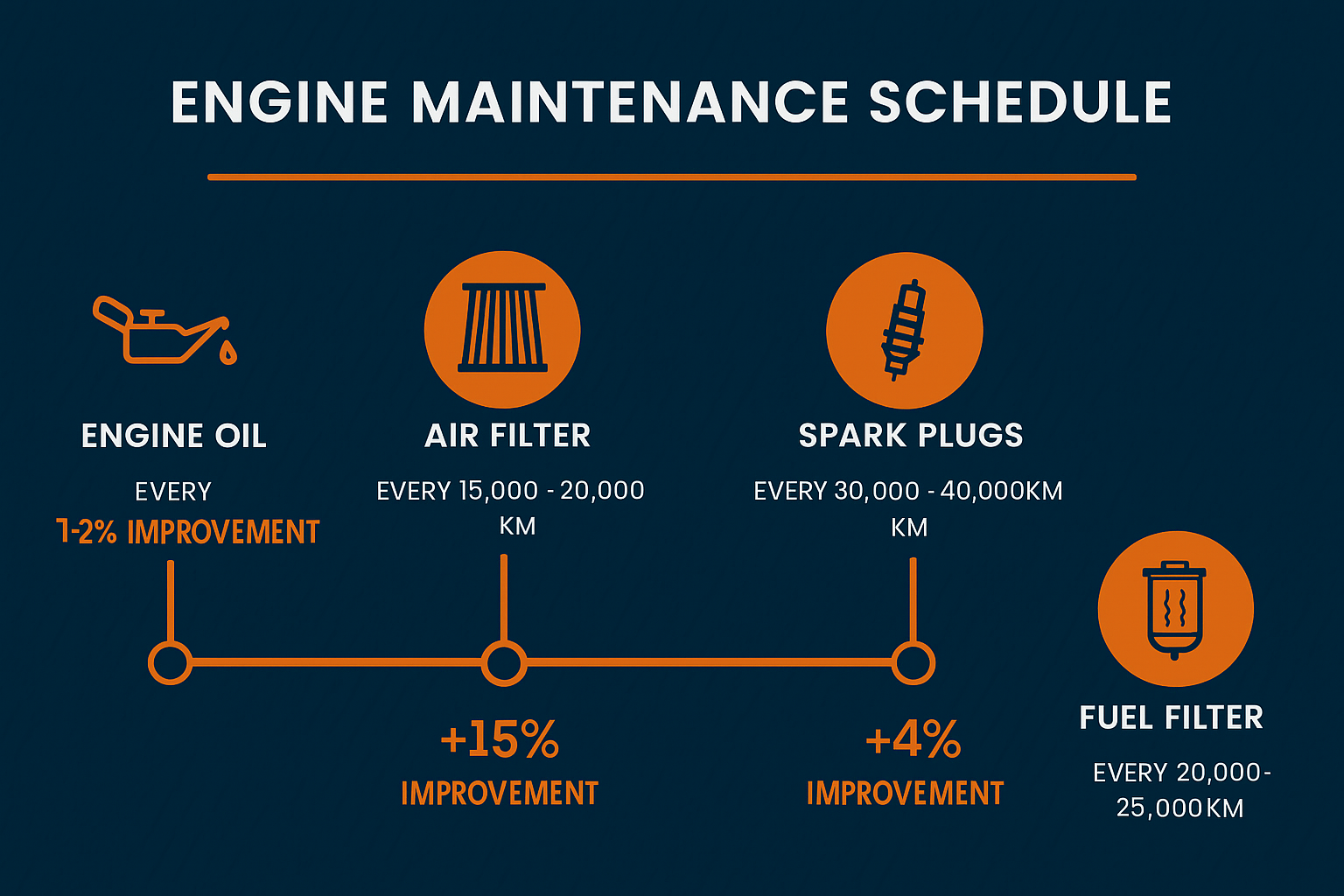
The choice between petrol or diesel significantly affects your vehicle’s fuel economy. Diesel engines typically offer 20-30% better fuel efficiency than petrol engines, but diesel cars often cost more upfront.
Petrol car owners can still achieve excellent mileage by following the tips to improve car mileage outlined above. Modern petrol cars like those in the best cars in India category offer impressive efficiency when driven properly.
Emerging Alternatives
Electric cars are becoming increasingly popular in India. While the cheapest electric cars in India require different considerations, many efficiency principles still apply, such as smooth driving and proper maintenance.
Common Mistakes That Lead to Poor Mileage
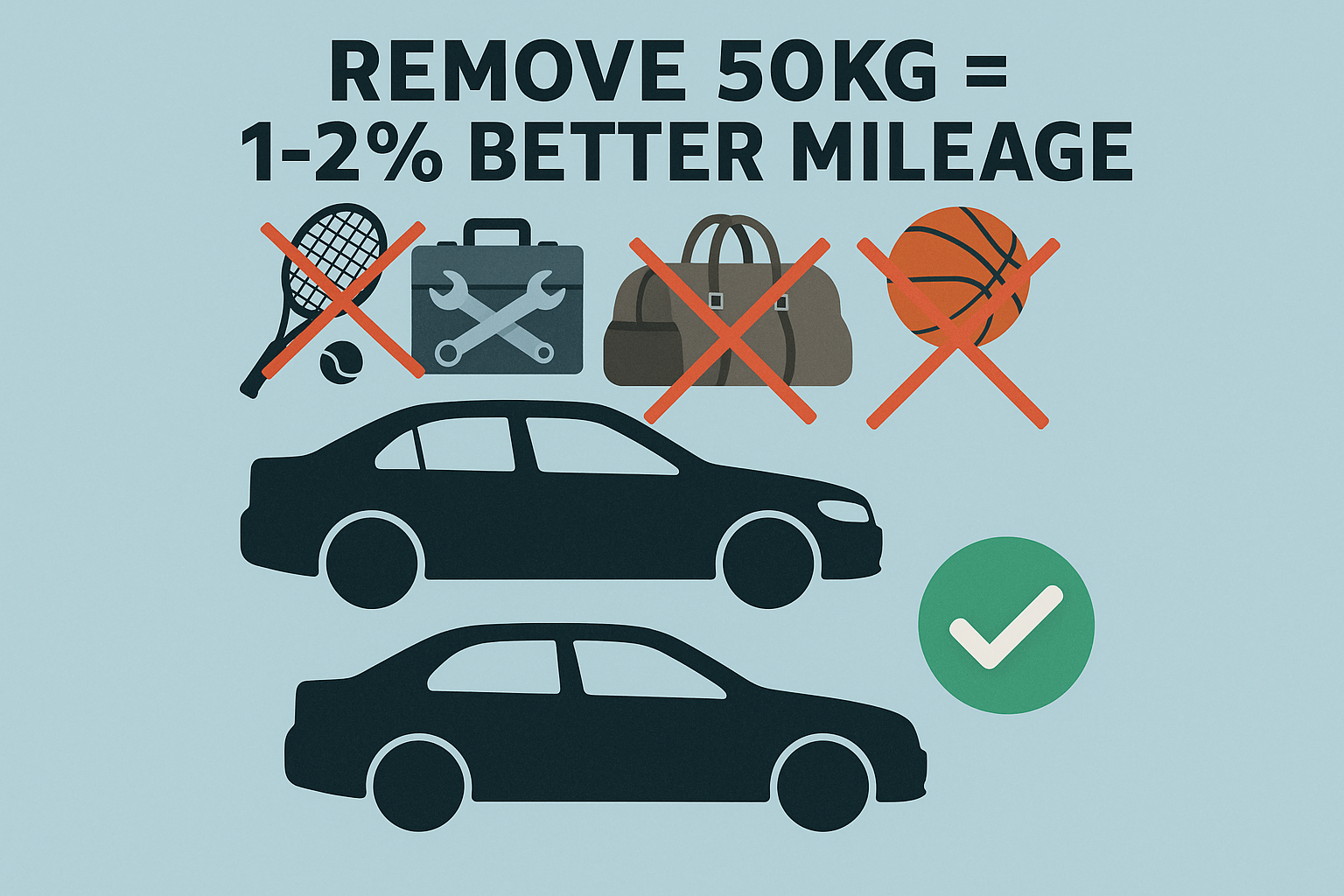
Understanding what leads to poor mileage helps you avoid these efficiency killers:
Driving Mistakes
- Aggressive driving and rapid acceleration
- Excessive idling
- Ignoring speed limits
- Poor route planning
Maintenance Oversights
- Skipping regular services
- Using wrong grade of engine oil
- Ignoring warning lights
- Delaying repairs
Vehicle Loading Issues
- Carrying unnecessary items
- Overloading the vehicle
- Using roof carriers permanently
- Poor weight distribution
Real-World Mileage vs. Manufacturer Claims
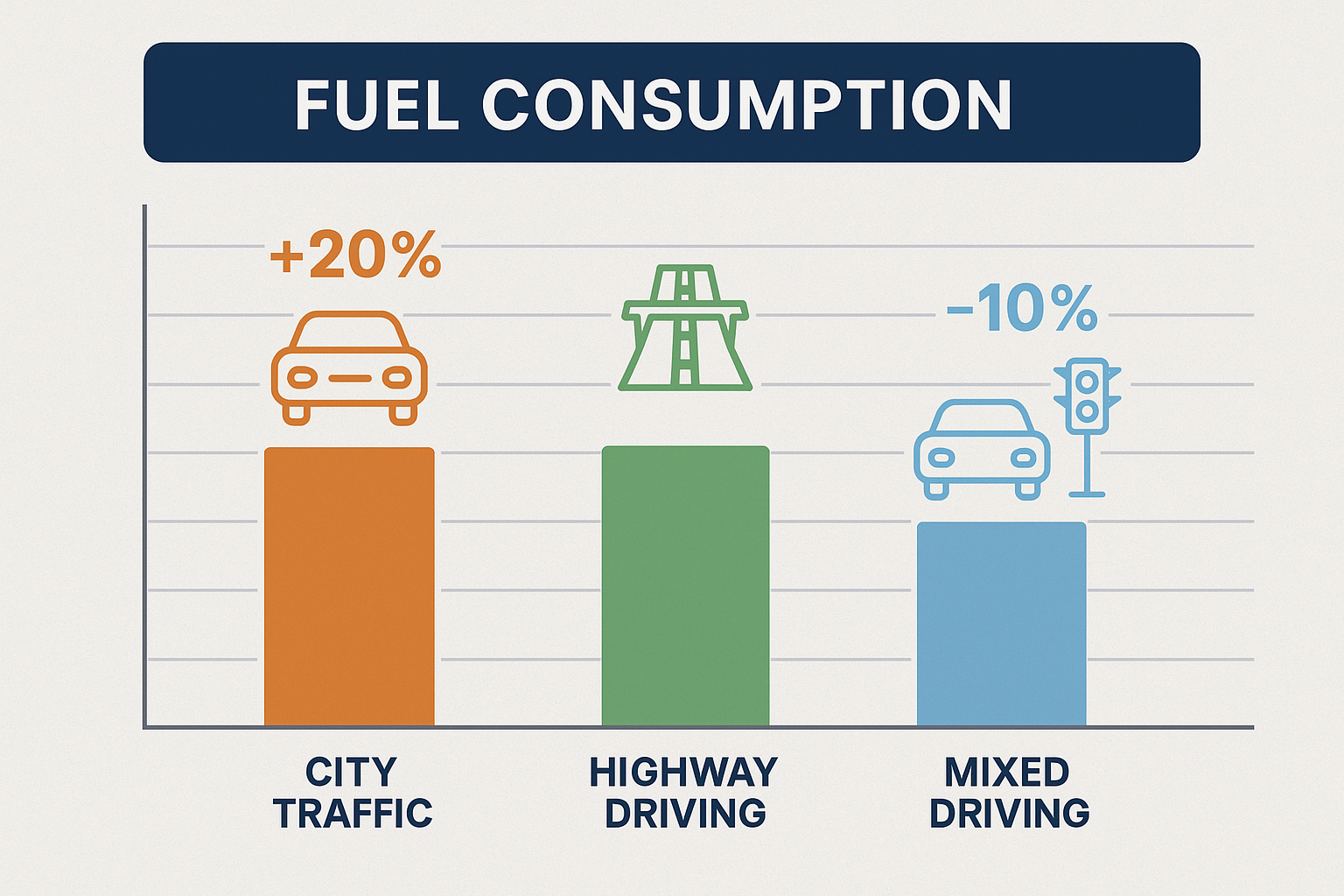
Real-world mileage often differs from manufacturer specifications due to various factors:
- Driving conditions (city vs. highway)
- Traffic patterns
- Climate and weather
- Vehicle age and condition
- Driver behavior
Vehicles like the Renault Triber may show different efficiency figures in real-world conditions compared to laboratory tests.
The Economic Impact of Better Fuel Efficiency
Improving your car’s fuel efficiency by just 20% can result in substantial savings:
- Monthly savings: ₹1,000-2,000 for average drivers
- Annual savings: ₹12,000-24,000
- Reduced maintenance costs: Better efficiency often correlates with better engine health
- Higher resale value: Well-maintained, efficient cars retain value better
Environmental Benefits of Improved Car Mileage
Better fuel efficiency isn’t just about saving money—it’s about reducing environmental impact:
- Lower CO2 emissions: Every litre of fuel saved prevents 2.3 kg of CO2 emissions
- Reduced air pollution: Efficient engines produce fewer harmful pollutants
- Resource conservation: Less fuel consumption means reduced demand for oil
- Climate impact: Transportation accounts for 24% of global CO2 emissions
Technology and Future of Fuel Efficiency
The automotive industry continues advancing fuel efficiency through:
- Hybrid technology: Combining petrol engines with electric motors
- Advanced materials: Lighter, stronger materials reduce vehicle weight
- Smart systems: AI-powered efficiency optimization
- Alternative fuels: Biofuels and hydrogen technologies
Seasonal Considerations for Optimal Fuel Efficiency
Different seasons affect fuel consumption differently:
Summer Tips
- Use AC efficiently
- Check tire pressure more frequently (heat affects pressure)
- Park in shade to reduce cabin heat
- Ensure cooling system is working properly
Winter Tips
- Allow engine to warm up briefly (but don’t over-idle)
- Check battery condition
- Use appropriate viscosity engine oil
- Clear ice and snow for better aerodynamics
Monsoon Tips
- Maintain good tire tread for safety and efficiency
- Use AC to defog windows instead of opening windows
- Plan routes to avoid waterlogged areas
- Check windshield wipers for clear visibility
Conclusion
Learning how to increase car mileage is both an art and a science that combines smart driving techniques, regular maintenance, and mindful vehicle operation. The practical tips I’ve shared can help you achieve 15-30% improvement in fuel efficiency without major modifications or investments.
Remember, car mileage improvement is a gradual process. Start with the easiest changes—adjusting your driving style, checking tire pressure, and removing excess weight. Then move on to more comprehensive maintenance and route optimization.
Your next steps:
- Calculate your current mileage using the interactive tool above
- Implement 2-3 tips from this guide immediately
- Track your progress for one month
- Gradually adopt more advanced techniques
- Share your results and inspire others to save fuel
The combination of rising fuel costs and environmental consciousness makes fuel efficiency more important than ever. Whether you drive a compact car or a larger SUV, these tips to increase car mileage will help you mileage and save fuel while contributing to a cleaner environment.
Start your fuel efficiency journey today—your wallet and the planet will thank you! 🌱
